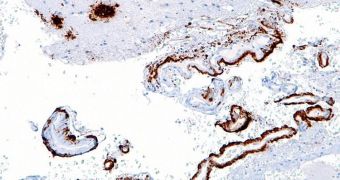A group of researchers from the Karolinska Institutet, in Sweden, reports that a vaccine against Alzheimer's has been successfully tested in a new series of clinical trials. The drug is said to be able to stop the disease from progressing.
The CAD106 vaccine holds great promise towards addressing this illness, the investigators report in the latest issue of the esteemed scientific journal Lancet Neurology. While the chemical is not able to wipe out the disease entirely, it does provide a new avenue of research for developing a way of doing so.
This disease is a seriously debilitating form of neurodegenerative dementia, and it is usually fatal. It tends to affect seniors, and this is a great concern to scientists since the population of the developed world is slowly aging.
According to official statistics released by the World Health Organization (WHO), it would appear that Alzheimer's is slowly growing into a global-scale epidemic. These data imply that the condition should be treated as such.
The new treatment proposed by the Swedish team relies on reactivating and boosting the effects of the human body's own immune defense against beta-amyloid proteins, the molecules thought to be responsible for the development of plaques between neurons in the brain.
Usually, the protein is found in the outer membranes of neurons, but it can sometimes avoid being broken down by natural clean-up mechanism. This leads to it accumulating in the membranes, eventually destroying them, and the entire cell.
All drugs on the market today address the symptoms of Alzheimer's, and not its root cause. This is where the KI-developed chemical differs from the crowd. It works by alerting the immune system that the beta-amyloid plaques don't belong in the brain.
The Swedish clinical trial found that 80+ percent of patients given CAD106 went on to develop their own antibodies against beta-amyloid, without causing any severe side-effects over 3 years of study.
CAD106 is primarily destined to be used on patients who suffer from mild to moderate Alzheimer's. If combined with early-detection methods, it could turn out to be an effective way of preventing the condition from progressing beyond mild cognitive impairment.
The investigation was led by Bengt Winblad, a professor with the KI Alzheimer's Disease Research Center, in Huddinge. He is also a leading neurologist in the Swedish Brain Power network.

 14 DAY TRIAL //
14 DAY TRIAL //